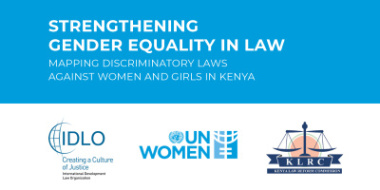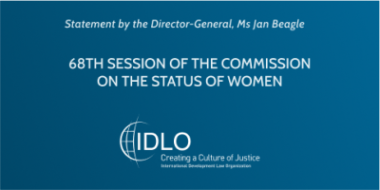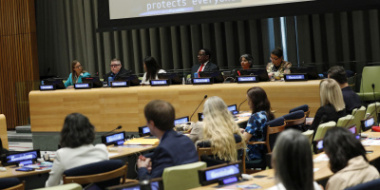Gender Equality
Gender inequality is an affront to human dignity, a challenge to the rule of law and an obstacle to development. Denying women of their rightful place in society – by depriving them of equal access to education, justice or livelihood – means robbing societies of the talent and potential of half of their members. In securing every social need from peace to food, the role of women has been shown to be paramount.
Although gender equality is increasingly a feature of national Constitutions, the law often continues to restrict women's rights and freedoms, dictates their submission to male relatives, or limits what they may own or inherit.
Advice from Justice Doherty to women: “Take any chance you get”
Born and raised in Portstewart, Northern Ireland, Justice Teresa Doherty spent 11 years as the only woman to hold high judicial office in the Pacific Islands.

Jordan: Research highlights barriers for women entrepreneurs
Lack of legal awareness, insufficient access to lawyers and justice mechanisms perceived as ineffective or unaffordable are among the obstacles most commonly experienced by women entrepreneurs in Jordan when attempting to access justice, according to the findings of a baseline assessment presented yesterday in Amman by the European Bank for Re

Strategic Investment in Rule of Law Programming
Growing insecurity and instability, recurring and protracted conflict and violence, increasing inequality, exclusion and discrimination, deterioration of international human rights and humanitarian norms, all signal the importance of strengthening the rule of law in today’s rapidly changing world. Notably, Goal 16 of the 2030 Agenda for Sustainable Development seeks to promote peace, justice and strong institutions.
Justice for women: Access, empowerment and representation
From conflict-affected countries and fragile states, to the halls of the most powerful decision-making bodies, women face significant barriers when it comes to access to justice, gender equality and empowerment.
Strengthening Access to Justice through Legal Aid in Indonesia
In 2011, Indonesia adopted a law on legal aid which includes a national budget for legal aid providers to deliver access to justice and legal aid services to the poor. However, there is a lack of legal aid lawyers and organizations throughout the country, and lawyers do not necessarily have the sufficient skills for delivering legal aid services with a human rights, gender equality and social justice perspective. Many organizations also deal with a limited administrative capacity and struggle to meet the requirements in conducting legal aid reimbursement.
Mongolia and U.S. exchange ideas on combatting domestic violence
Home to around 2,600 Mongolian Americans, the city of Arlington, Virginia has one of the largest Mongolian populations in the United States, to the point that Mongolian is the third-most widely spoken language in the local school system.
Access to Justice for Women and Girls - Rule of Law in Action
HIGH-LEVEL SIDE EVENT
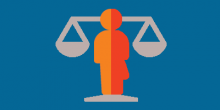
Inaugural meeting of High-level Group on Justice for Women
Inaugural meeting: High-level Group on Justice for Women
High-level Group on Justice for Women
Inaugural Meeting: High-level Group on Justice for Women
Update (as of July 27, 2018): The Inaugural Meeting Report is now available below
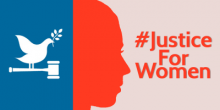
Pages
Key Initiatives
-
 The COVID-19 pandemic poses a significant threat to the right to food for populations, and especially for marginalized groups. In many countries, COVID-19 is intertwining with pre-existing factors affecting food security and nutrition, by limiting the access to affordable and nutritious food, including lack of economic opportunities, extreme weather conditions, ongoing conflicts and more.
The COVID-19 pandemic poses a significant threat to the right to food for populations, and especially for marginalized groups. In many countries, COVID-19 is intertwining with pre-existing factors affecting food security and nutrition, by limiting the access to affordable and nutritious food, including lack of economic opportunities, extreme weather conditions, ongoing conflicts and more. -
 As part of IDLO’s continuous commitment to accountability and results-based management, IDLO is pleased to share this Evaluation Brief for the project, "Integrating Legal Empowerment and Social Accountability for Quality HIV Health Services for Adolescent Girls and Young Women". The evaluation has been conducted by independent evaluation experts, supervised by IDLO’s Evaluation Unit. This exercise utilized a theory-driven, mixed-method approach, in line with the IDLO Evaluation Guidelines and OECD DAC standards.
As part of IDLO’s continuous commitment to accountability and results-based management, IDLO is pleased to share this Evaluation Brief for the project, "Integrating Legal Empowerment and Social Accountability for Quality HIV Health Services for Adolescent Girls and Young Women". The evaluation has been conducted by independent evaluation experts, supervised by IDLO’s Evaluation Unit. This exercise utilized a theory-driven, mixed-method approach, in line with the IDLO Evaluation Guidelines and OECD DAC standards. -
 Since the revolution in 2011, Tunisia has experienced a period of significant political transition and change culminating in the adoption of a new constitution in 2014, which called for justice reform and protection of women’s rights. However, the practical application of the framework for legal assistance in Tunisia demonstrates the insufficiency of existing relevant mechanisms. Therefore, there is the strong need to empower women to access justice and claim their rights.
Since the revolution in 2011, Tunisia has experienced a period of significant political transition and change culminating in the adoption of a new constitution in 2014, which called for justice reform and protection of women’s rights. However, the practical application of the framework for legal assistance in Tunisia demonstrates the insufficiency of existing relevant mechanisms. Therefore, there is the strong need to empower women to access justice and claim their rights. -
 For over 15 years, IDLO has been assisting the Government of the Islamic Republic of Afghanistan develop accessible, accountable, effective and efficient justice sector institutions. While significant progress has been made, many challenges remain, frequently perceived to be rooted in the ongoing conflict, the impact of insecurity and the public’s fear for their safety. There is a strong need to address the concerns and goals of the justice sector and find innovative solutions and methods to strengthen its resilience.
For over 15 years, IDLO has been assisting the Government of the Islamic Republic of Afghanistan develop accessible, accountable, effective and efficient justice sector institutions. While significant progress has been made, many challenges remain, frequently perceived to be rooted in the ongoing conflict, the impact of insecurity and the public’s fear for their safety. There is a strong need to address the concerns and goals of the justice sector and find innovative solutions and methods to strengthen its resilience. -
 Lack of access to a fair and equitable justice system is one of the most pressing problems confronting modern Somalia on its path towards stability and reconstruction. Informal justice systems, offering alternative dispute resolution are often much better placed to respond to the immediate justice needs of many Somalis seeking justice, as they have more legitimacy and are more easily accessible. To enhance access to justice in Somalia, it is therefore essential to engage with the alternative dispute resolution systems.
Lack of access to a fair and equitable justice system is one of the most pressing problems confronting modern Somalia on its path towards stability and reconstruction. Informal justice systems, offering alternative dispute resolution are often much better placed to respond to the immediate justice needs of many Somalis seeking justice, as they have more legitimacy and are more easily accessible. To enhance access to justice in Somalia, it is therefore essential to engage with the alternative dispute resolution systems.
Latest Activity
|
Publication
|
|
Policy Statements
|



